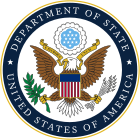Richard Bordeaux Parker
Richard Bordeaux Parker | |
|---|---|
| United States Ambassador to Algeria | |
| In office January 17, 1975 – February 12, 1977 | |
| President | Gerald Ford Jimmy Carter |
| Preceded by | John D. Jernegan |
| Succeeded by | Ulric St. Clair Haynes, Jr. |
| United States Ambassador to Lebanon | |
| In office 1977–1978 | |
| President | Jimmy Carter |
| Preceded by | Francis E. Meloy, Jr. |
| Succeeded by | John Gunther Dean |
| United States Ambassador to Morocco | |
| In office 1978–1979 | |
| President | Jimmy Carter |
| Preceded by | Robert Anderson |
| Succeeded by | Angier Biddle Duke |
| Personal details | |
| Born | July 3, 1923 Fort Stotsenburg, Philippines |
| Died | January 7, 2011 (aged 87) Washington, D.C. |
| Profession | Diplomat, Career Ambassador |
 |
| U.S. Near Eastern Affairs Diplomats |
|---|
|
Loy W. Henderson (1922–1960) |
Richard Bordeaux Parker (July 3, 1923 – January 7, 2011) was a United States Foreign Service Officer and an expert on the Middle East. Parker served as Ambassador to Algeria, Lebanon and Morocco.
He was the brother of David Stuart Parker.
Early life[]
Parker was the son of Col. Roscoe Parker, a U.S. Army officer (Cavalry), and grew up in U.S. Army posts across the southwest with a stint in Vermont and another in Kansas. He attended Kansas State University, graduating in 1943. After college, Parker served as an infantry officer with the 106th Infantry Division (first platoon of the Anti-Tank Company of the 422nd Infantry Regiment) during World War II, where he was captured by the Germans at the Battle of the Bulge and briefly imprisoned. [1] After the war, he returned to Kansas State, where he earned a master's degree, before joining the U.S. Foreign Service in 1949. Captured at the same time as Parker, was Donald Prell, who commanded the second platoon of the Anti-Tank Company.[2]
Diplomatic career[]
This section does not cite any sources. (September 2015) |
Parker served as deputy chief of mission in Rabat, Morocco from 1970 to 1974. He was ambassador to Algeria from 1975 to 1977, to Lebanon in 1977, and finally to Morocco from 1978 to 1979. He retired from the U.S. Foreign Service in 1981 and became the editor of The Middle East Journal. In addition to his diplomatic career, Parker taught at the University of Virginia, Johns Hopkins University, and Lawrence University. He also served as the first president of the Association for Diplomatic Studies and Training from 1986 to 1989.
In 1982, Parker participated in a study group held at the Council on Foreign Relations where he discussed current problems in North Africa. After these meetings Parker spent two years compiling and writing North Africa: Regional Tensions and Strategic Concerns. His book was published in relation with and through the Council on Foreign Relations.
In June 2004, Parker received the American Foreign Service Association's lifetime Contributions to American Diplomacy award.
Service chronology[]
| Position | Host country or organization | Year |
|---|---|---|
| US Foreign Service | 1949 to 1958 | |
| US Foreign Service | Washington, D.C. | 1958 to 1961 |
| US Foreign Service | Beirut, Lebanon | 1961 to 1964 |
| US Foreign Service (Master's degree) | Princeton, New Jersey | 1964 to 1965 |
| US Foreign Service | Cairo, Egypt | 1965 to 1967 |
| US Foreign Service | Washington, D.C. | 1967 to 1970 |
| US Foreign Service (Deputy Chief of Mission) | Rabat, Morocco | 1970 to 1974 |
| U.S. Ambassador | Algiers, Algeria | 1974 to 1977 |
| U.S. Ambassador | Beirut, Lebanon | 1977 to 1978 |
| U.S. Ambassador | Rabat, Morocco | 1978 to 1979 |
Papers[]
Ambassador Parker's papers are held at Georgetown University, in Washington, D.C.
Some of Richard Bordeaux Parker's photographs [3] are held at the Freer Gallery and Arthur M. Sackler Gallery Archives in Washington, D.C. The collection includes black and white negatives of Islamic architecture throughout Algeria, Cairo, Lebanon, Syria, Jordan, Morocco, and Spain.[4]
Published books[]
- A Practical Guide to Islamic Monuments in Cairo, 1974
- A Practical Guide to Islamic Monuments in Morocco, 1981
- North Africa: Regional Tensions and Strategic Concerns, (ISBN 0-275-92773-3, 1987) (revised and updated version)
- The Politics of Miscalculation in the Middle East, (ISBN 0-2532-0781-9, 1993)
- The Six-Day War: A Retrospective, (ISBN 0-8130-1383-6, 1996)
- The October War, (ISBN 0-8130-1853-6, 2001)
- Uncle Sam in Barbary: A Diplomatic History, (ISBN 0-8130-2696-2, 2004)
- Memoirs of a Foreign Service Arabist, (ISBN 978-0-9886376-6-5, 2013)
Obituaries and Biographies[]
References[]
- ^ https://www.washingtonpost.com/wp-dyn/content/article/2011/02/04/AR2011020406583.html
- ^ http://www.indianamilitary.org/German%20PW%20Camps/Prisoner%20of%20War/PW%20Camps/Oflag%20XIII-B/Prell/Prell-Donald.pdf
- ^ "Search results for: Richard Bordeaux Parker%27s, page 1 | Collections Search Center, Smithsonian Institution".
- ^ "Archived copy". Archived from the original on 2006-08-30. Retrieved 2006-09-09.CS1 maint: archived copy as title (link)
External links[]
- 1923 births
- 2011 deaths
- People from Kansas
- Ambassadors of the United States to Algeria
- Ambassadors of the United States to Lebanon
- Ambassadors of the United States to Morocco
- United States Army personnel of World War II
- Kansas State University alumni
- Lawrence University faculty
- United States Foreign Service personnel
- World War II prisoners of war held by Germany
- United States Army officers
- American prisoners of war in World War II